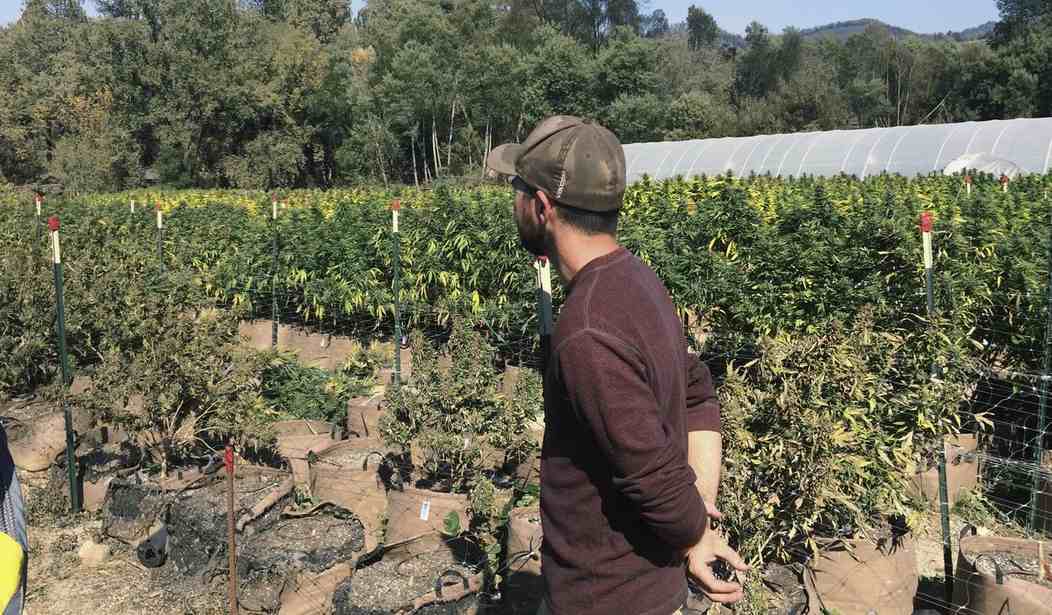The war on drugs has been going on since 1971, and we have a winner: marijuana. Back then, possession of pot carried heavy penalties in many states -- even life imprisonment. Today, 29 states sanction medical use of cannabis, and eight allow recreational use. Legal weed has become about as controversial as Powerball.
One sign of the shift came in Wednesday's debate among the Democrats running for governor of Illinois. The state didn't get its first medical marijuana dispensary until 2015, and it decriminalized possession of small amounts of pot only last year. But most of the candidates endorsed legalization of recreational weed, and one supported "full decriminalization."
Those positions are not politically risky, in Illinois or most places. They're mainstream.
In 2016, Gallup Poll found that 60 percent of Americans supported full legalization -- up from 36 percent in 2005. Given the choice, voters generally favor it. Nine states had cannabis initiatives on the ballot last year. Medical marijuana won in four states, and recreational pot won in another four. Only Arizona's recreational pot measure failed.
Next year should further erode pot prohibition. "Campaigns are underway in at least five states to legalize either medical or recreational cannabis," reports Marijuana Business Daily. It also notes that New Jersey, Rhode Island and Vermont could get recreational cannabis through legislative action.
All this progress has occurred even though federal law bars possession and use -- impeding normal commerce in states that permit dispensaries. Under President Barack Obama, the Justice Department chose to defer to states that allowed cannabis. But banks generally are leery of doing business with pot dispensaries, forcing many to operate on cash alone.
As a candidate, Donald Trump indicated he would follow more or less the same course as Obama. Attorney General Jeff Sessions, however, has been an implacable opponent of liberalization. He once joked -- well, I assume he was joking -- that he had no problem with the Ku Klux Klan until he "found out they smoked pot."
Recommended
He appointed a task force on crime, hoping it would confirm his preposterous claim that Obama's laissez-faire policy was to blame for rising violence. But the panel report, which has not been made public, recommended sticking with that approach.
The case for full legalization becomes stronger all the time. One reason is that the disproportionate impact on African-Americans has gained more attention. Blacks are nearly four times likelier to be arrested for pot possession than whites even though there is no racial difference in usage.
Drug enforcement has been a major motive for stop-and-frisk tactics that have fostered resentment of cops among black men. Treating cannabis like beer or cigarettes would greatly curtail such encounters.
For years, opponents said legalization would lead to disaster. But as Supreme Court Justice Oliver Wendell Holmes Jr. noted, "A page of history is worth a volume of logic." We no longer have to rely on ominous forecasts. We now have actual experience in states that have taken the leap, and the results refute the fears.
Studies show that after Colorado permitted recreational pot, there was no increase in adolescent use or traffic fatalities. In Washington, which voted for legalization in 2012, crime rates proceeded to decline. California found that when medical dispensaries closed, neighborhood crime didn't fall; it rose.
This year, the National Academies of Sciences, Engineering and Medicine found "substantial evidence that cannabis is an effective treatment for chronic pain in adults." That helps explain why states that allow cannabis have far lower rates of opioid overdoses. The simple reality is that marijuana eases suffering and saves lives.
States with fiscal problems -- Illinois being a prominent example -- also stand to gain from allowing recreational pot. First, they don't have to spend so much money arresting, trying and incarcerating users and sellers. Second, they get a windfall from taxing a product that previously sold only on the black market. Washington's cannabis taxes bring in about $250 million a year.
State governments can also expect savings in Medicaid and other health care programs as some patients opt for inexpensive cannabis over pricey prescription drugs. There are also financial savings for ambulances, hospitals and morgues when fewer people overdose with opioids -- not to mention a lower toll in human misery and heartache.
It's too late to undo all the harm produced by the war on drugs. But Americans are realizing it's never too late to enjoy the benefits of peace.
























Join the conversation as a VIP Member